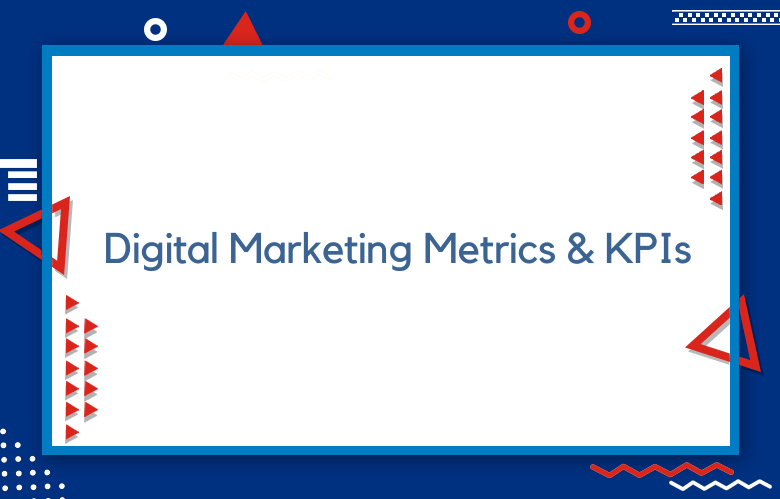Digital Marketing Metrics and KPIs You Should Know

Understanding Digital Marketing Metrics and KPIs
Digital marketing metrics and key performance indicators(KPIs) are tools for measuring digital success.
If you’re trying to improve your online presence, understanding the various metrics and KPIs is essential. We’ll explore these terms, their use, and why they matter for your business.
What are Digital Marketing Metrics?
Digital marketing metrics measure activity related to a digital marketing campaign or strategy. These measurements can be anything from website visits to newsletter sign-ups or downloads of a white paper.
Metrics are important because they provide insight into a campaign or strategy’s success.
For example, if you’re trying to increase your website visits, tracking the number of visitors each month can give you an idea of your success.
The most common digital marketing metrics include website traffic, click-through rate (CTR), conversion rate (CVR), bounce rate (BR), cost per click (CPC), cost per acquisition (CPA), impressions, unique visitors, leads generated, and customer acquisition cost (CAC).
Each metric has significance and can be tracked through analytics software such as Google Analytics or Adobe Analytics.
What are KPIs?
KPIs are key performance indicators that help you estimate the success of your digital marketing strategy or campaigns about specific goals or objectives.
For example, if your goal is to raise website traffic by 20%, tracking total website visits would be a KPI for measuring progress toward reaching that goal.
It’s important to note that KPIs must be measurable and quantifiable to help track progress toward achieving a goal or objective.
Other KPIs include open email rate, lead generation rate, customer lifetime value (CLV), return on investment (ROI), social media engagement rate, and more.
Why are Metrics and KPIs meaningful?
Metrics and KPIs provide valuable insight into your digital marketing campaigns’ effectiveness.
They allow you to make well-informed decisions about which tactics are working and which ones need improvement.
With them, it would be easier to determine where to concentrate your efforts to maximize the results of each campaign.
They enable you to compare one campaign against another so you can adjust your strategy accordingly.
Metrics vs. KPIs
It’s essential to understand the difference between metrics and KPIs. Metrics are activity measures, while KPIs measure performance to a specific goal.
For example, if you want to measure how many people visit your website each day, that would be a metric.
However, if you want to measure how many of those visitors convert into paying customers, that would be a KPI.
Google Analytics
Google Analytics is one of the most popular tools for measuring digital marketing success.
It offers various features that allow you to track user engagement with your site and other vital metrics such as page views, bounce rate, time on page, and more.
It also lets you set goals to track key performance indicators (KPIs).
Social Media Insights
If your business has an active presence on social media platforms like Facebook or Twitter, measuring the effectiveness of your campaigns is essential.
Most social media platforms have insight tools that allow you to observe critical metrics such as followers and interactions over time.
You can even set up custom reports to easily spot trends in user engagement and adjust your strategies accordingly.
Email Marketing Reports
For businesses that rely heavily on email campaigns, it’s essential to measure the effectiveness of each campaign to optimize future campaigns accordingly.
Many email marketing platforms offer detailed reports on open rates, click-through rates, unsubscribes, etc.,
She allowed users to quickly identify which emails performed best and where improvements could be made in future campaigns.
How to Measure Your Digital Marketing Efforts with Metrics and KPIs
Digital marketing is an efficient tool that can help businesses reach their goals, but only if used correctly.
Measuring your digital marketing campaigns’ success is essential so you know what works and what doesn’t.
The best way to do this is by tracking metrics and setting key performance indicators (KPIs).
We’ll discuss digital marketing metrics and KPIs, why they’re essential, and how to measure your digital marketing efforts.
Tools for Measuring Your Digital Marketing Success
With the rise of digital marketing, measuring your success online is more important than ever.
Having the right metrics and KPIs (key performance indicators) can help you monitor whether your digital marketing efforts are taking off or falling flat.
We’ll explore some of the most popular tools for measuring your digital marketing success and show you how to get started.
What’s the difference between Metrics vs. KPIs?
We must understand their differences before we get into the specifics of different digital marketing metrics and KPIs.
Metrics are quantitative measurements that provide insight into your overall performance.
They are usually tracked over time so you can see patterns in your data, such as growth or engagement trends.
Conversely, KPIs are qualitative measures that provide a more detailed view of your performance, such as customer satisfaction or website traffic.
While metrics give you an overall view, KPIs focus on specific areas so you can develop strategies for improvement.
Types of Digital Marketing Metrics
Different digital marketing metrics can be used to measure success in various areas, such as website traffic, lead generation, customer acquisition, and customer retention.
Some examples include page views per visitor, bounce rate, time on site, cost per conversion, leads generated per campaign/month/year, cost per lead (CPL), customer lifetime value (CLV), return on investment (ROI), social media reach, email open rates, click-through rates (CTRs), etc.
These metrics should be tracked over time to identify any changes or trends in performance or user behavior that may need further investigation or optimization efforts to maximize results from your campaigns.
Types of Digital Marketing KPIs
KPIs are typically more focused than metrics since they analyze specific aspects of performance, such as product quality or customer experience, rather than overall performance indicators, like website traffic or cost per conversion.
Examples include customer satisfaction ratings, number of referrals/referral conversions per month/year, average order size/value/growth rate for e-commerce stores, etc.
These measures help businesses better understand their customers by providing detailed insight into their preferences and buying habits, which allows them to tailor their products/services accordingly for maximum ROI from campaigns.
Digital Marketing Reporting Consulting
Reporting is an integral part of the consultative process when it comes to digital marketing. Proper reporting gives clients the insight needed to make informed decisions, and these reports help them understand the value their digital marketing efforts are providing. For a consultant, analyzing and interpreting data accurately is essential for delivering effective results.
A comprehensive yet concise report can be challenging, but creating one that engagingly highlights critical performance metrics is possible with the right tools and techniques. Here are some tips for creating and presenting effective digital marketing reports:
Identify key performance indicators (KPIs) – When creating a digital marketing report, it’s essential to identify the KPIs that will provide valuable insights into the overall performance of your campaigns. These should include metrics like website visits, conversions, bounce rate, and other vital factors that help you determine success or failure.
Analyze data: Once you have identified your KPIs, use analytics software such as Google Analytics or Adobe Analytics to define your goals and track their progress. It will enable you to measure performance over time and compare it across different channels or campaigns.
Track trends: By tracking trends over time in your analytics software, you can start identifying patterns affecting performance or uncover new opportunities for improvement. You can also track changes in user behavior and engagement levels on social media platforms such as Twitter and Instagram using tools like Klout score or Followerwonk.
Compare against benchmarks: It’s important to benchmark your results against others in your industry to see how well you’re doing relative to competitors or peers in similar industries. Using competitive intelligence tools such as SEMrush can help you better grasp your performance compared with others in the same space.
Visualize data: Visualizing data makes it easier for clients to understand what is happening in their campaigns at any given time by representing complex data sets in simple graphics such as charts and graphs, making results more meaningful. By presenting information this way, they can quickly spot trends or areas of opportunity without deciphering large tables of raw numbers first-hand, which would be difficult for many laypeople.
Provide commentary: Data alone doesn’t tell a story; adding context helps clients understand what they see in their reports so they know what actions to take next. In addition to visualizations, include commentary after each set of results that explains why specific outcomes occurred–this provides added value beyond simply displaying numbers on the screen.
By following these steps when creating an effective digital marketing report, consultants can provide valuable insight into their client’s campaigns while helping them make better decisions about their future strategies from an analytical perspective.
Conclusion
Digital marketing metrics and KPIs are essential tools for measuring the success of any digital marketing campaign or strategy.
By understanding which metrics and KPIs matter most for your business goals, you can track progress towards those goals more effectively and make informed decisions about allocating resources to get the best results possible from your digital efforts.
With careful tracking of metrics and attention paid to KPIs, you will be well on your way to success with your digital marketing initiatives!
Call: +91 9848321284
Email: [email protected]



